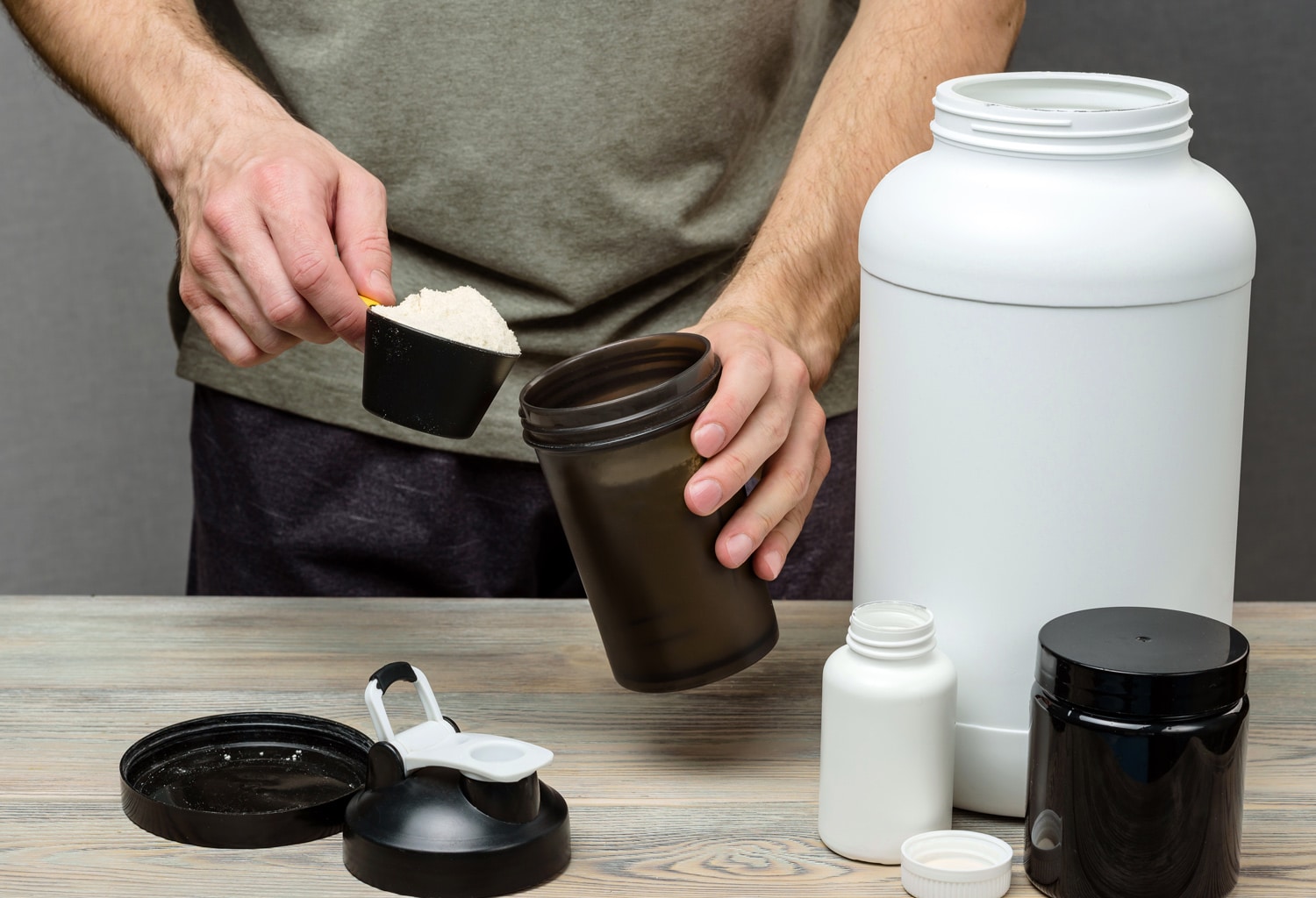Protein is the building block of muscle and arguably the favorite macronutrient of bodybuilders. The ideal time to consume protein is a hotly contested debate. However, nutrition scientist Dr. Layne Norton points out that your total daily protein intake is more crucial for building muscle than trying to time your protein intake after a workout. (1)
Many experts believe consuming a protein shake a couple of hours before or after your training session can help prioritize muscle protein synthesis and maximize your gains.
Research suggests that a high-protein breakfast can boost hypertrophy. Starting your day with the right foot also limits cravings and reduces your chances of feasting on junk food throughout the day. (2)
Since I train a couple of hours after waking up, I decided to embark on a 30-day morning whey protein shake challenge.
In this article, I share everything you must know about drinking whey protein first thing in the morning and the results of this challenge, including its effects on muscle mass, metabolism, and energy levels.
Results of Drinking Protein Shake For 30 Days
Here is a week-by-week account of my experience drinking a protein shake every morning:
Week One
Before starting to drink a whey protein shake each morning, I usually ate a banana before heading to the gym. Although the simple sugars in bananas did give me an energy boost, I experienced a dip in my performance beyond the one-hour mark.
My experience with whey protein shakes was significantly different, as they delivered a steady supply of energy even for my longer workouts, which usually last between 1.25 to 1.5 hours.
Switching to a new routine (training or nutrition) requires a mental shift. There were days when I automatically reached for a banana. However, I never felt I was missing out on something in my morning routine throughout this challenge.
Although I didn’t notice any significant changes on the scale or tape measure in the first week, I could feel I was moving in the right direction.
Week Two
A change in your training or diet regime usually involves some adjustment period. Things started clicking for me in the second week, and I felt in total control.
My overall strength started rising in Week Two, and no, this wasn’t just a subjective feeling; my workout log book backed this up. Progressive overload was my priority in the second week, as I aimed to increase my training volume with each workout. I did so by using heavier loads, doing more sets and reps, using advanced training techniques like supersets and dropsets, and limiting rest time between sets.
Whenever I start a new challenge, my motivation is through the roof, and I try to push myself to the limit in each training session. I did more sets or reps if I couldn’t lift heavier weights in an exercise compared to the previous week.
I experienced an uptick in my work capacity in Week Two, and I lost a kilogram (2.2 pounds) in 14 days, which was mind-blowing.
Week Three
Whenever I lose weight, I usually experience lower energy levels. However, it wasn’t the case this time around. My performance remained consistent throughout the day, proving the metabolic benefits of starting your day with a high-protein meal.
I also added a high-protein food source, like chicken breast, salmon, or eggs, to each meal throughout the day for optimal muscle recovery and growth.
All the additional volume from the previous week started to pay off in the third week. I noticed a significant improvement in my muscle definition and strength, particularly in my arms and shoulders.
But you must remember that no two people will experience identical results from a training program. Your gains depend on multiple factors, including your genetics, training experience, objectives, diet, and recovery.
Now that my physique transformation was undeniable, my confidence soared, which boosted my training performance further.
Week Four
I had a simple plan for the final week — go full-send in every workout.
Once you know you have nine odd days left in a challenge, you cannot afford complacency. This was a unique challenge — let me explain.
If this were a push-up challenge, you would typically increase the total number of push-ups performed in the final week. Similarly, you would do more squats toward the end of a 30-day challenge.
But since I always prioritize a balanced, whole-food diet, I stuck to one protein shake throughout the whole month. Nonetheless, I was able to hit my daily protein intake every day, which helped streamline my muscle recovery and growth.
This 30-day protein shake ritual was an all-round blockbuster. I witnessed a significant drop in my body weight in four weeks (four kilograms), and my body composition changed drastically.
Honestly, I wasn’t expecting much from this 30-day morning protein shake challenge, but the physical and mental boost it delivered has me totally convinced.
I have since made a morning whey protein shake a staple in my diet and don’t intend to change that any time soon.
Challenges and Setbacks During the 30-Day Morning Protein Shake Ritual
Even though this month-long challenge sounds pretty straightforward, it has its fair share of challenges. Here is a brief overview of the setbacks you might face:
Taste Fatigue
It’s one thing to drink a protein shake after a training session, but starting your day with the same protein shake for an extended period is a completely different ball game. If your budget permits, I recommend getting two to three different flavors of protein shakes and alternating between them to keep things fresh.
Digestive Issues
Different people can have unique reactions to protein powders, especially when consumed on an empty stomach. Some people report digestive discomfort, bloating, and gas when starting their days with a protein shake.
Always get a smaller packaging when trying a new protein supplement to see how your body reacts to it. You should be extra careful if you are allergic or sensitive to ingredients used in sports nutrition supplements.
Cost
Some people prefer consuming their protein shakes in the evening, especially if they train in the evening. Adding another serving of a protein supplement can burn a hole in your wallet.
The Science of Protein Shakes and Body Transformation
Protein is one of the three macronutrients besides carbs and fats and is the most important if you’re aiming to build muscle. Here are the science-backed benefits of hopping onto a morning protein shake ritual:
Builds Muscle
Whey protein supplements can help boost muscle and strength gains and overall physical functionality, especially when combined with resistance training (3)(4). They do so by optimizing muscle protein synthesis and promoting recovery.
Drinking a delicious whey protein shake is one of the best ways to start your day. I also added other essentials like multivitamins and creatine to my morning routine to ensure I wasn’t leaving any gaps in my diet.
Boost Metabolism & Weight Loss
A human randomized controlled trial concluded that consuming a whey protein drink before breakfast decreased energy intake at breakfast and lunch. This suggests that protein shakes in the morning might help with appetite control and weight management. (5)
Some studies also tout whey protein as an effective fat-loss tool as it can increase metabolism by boosting energy expenditure and satiety (6). Adding a whey protein supplement to your routine can be incredibly effective for enhancing fat oxidation and improving body composition.
Sustained Energy
Dipping energy levels can hamper your training performance and subsequent results. Also, if you’ve been encountering constant mid-day crashes, you should consider adding a protein shake to your morning routine.
Contrary to what most people think, low energy levels not only affect your training volume and intensity but also hamper your focus and motivation.
Unlike carbs, which deliver a quick energy spike that is often followed by a crash due to fluctuations in blood sugar levels, protein provides a sustained energy release.
Conclusion
Starting your day with a whey protein shake can help boost your metabolism, build muscle mass, and enhance your energy levels. People who work early in the morning can experiment with drinking a whey protein shake first thing in the morning.
Remember, protein shakes are called a supplement for a reason: ensure a balanced training, nutrition, and recovery program to maximize your gains. Stick to a personalized training regime for at least eight to 12 weeks, and you’ll experience the benefits of this routine firsthand.
If you have any questions about drinking whey protein shakes first thing in the morning, drop them in the comments below, and I’ll be happy to help!
References:
- Schoenfeld BJ, Aragon AA, Krieger JW. The effect of protein timing on muscle strength and hypertrophy: a meta-analysis. J Int Soc Sports Nutr. 2013;10(1):53. Published 2013 Dec 3. doi:10.1186/1550-2783-10-53
- Khaing, I. K., Tahara, Y., Chimed-Ochir, O., Shibata, S., & Kubo, T. (2024). Effect of breakfast protein intake on muscle mass and strength in adults: a scoping review. Nutrition reviews, nuad167. Advance online publication. https://doi.org/10.1093/nutrit/nuad167
- Pasiakos, S. M., McLellan, T. M., & Lieberman, H. R. (2015). The effects of protein supplements on muscle mass, strength, and aerobic and anaerobic power in healthy adults: a systematic review. Sports medicine (Auckland, N.Z.), 45(1), 111–131. https://doi.org/10.1007/s40279-014-0242-2
- Mertz, K. H., Højfeldt, G., Jensen, M., Schacht, S. R., Lind, M. V., Rasmussen, M. A., Mikkelsen, U. R., Tetens, I., Engelsen, S. B., Nielsen, D. S., Jespersen, A. P., & Holm, L. (2021). The effect of daily protein supplementation, with or without resistance training for 1 year, on muscle size, strength, and function in healthy older adults: A randomized controlled trial. The American journal of clinical nutrition, 113(4), 790–800. https://doi.org/10.1093/ajcn/nqaa372
- Oberoi, A., Giezenaar, C., Clames, A., Bøhler, K., Lange, K., Horowitz, M., Jones, K. L., Chapman, I., & Soenen, S. (2020). Whey Protein Drink Ingestion before Breakfast Suppressed Energy Intake at Breakfast and Lunch, but Not during Dinner, and Was Less Suppressed in Healthy Older than Younger Men. Nutrients, 12(11), 3318. https://doi.org/10.3390/nu12113318
- Leidy, H. J., Clifton, P. M., Astrup, A., Luscombe-Marsh, N. D., Woods, S. C., & Mattes, R. D. (2015). The role of protein in weight loss and maintenance. The American journal of clinical nutrition, 101(6), 1320S–1329S. https://doi.org/10.3945/ajcn.114.084038
Tip: If you're signed in to Google, tap Follow.













